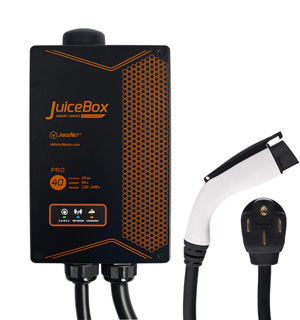San Francisco: Electric vehicle charging station manufacturer eMotorWerks in San Carlos announced the availability June 29 of its new JuiceNet cloud platform, allowing owners of solar arrays to combine smart electric vehicle charging with their solar generation. The new systems are designed to maximize customers’ renewable energy self-consumption and increase energy savings. Whether it's just a few panels on the homeowner's roof or a multi-megawatt utility-scale power plant, the company says its JuiceNet Solar uses advanced algorithms and charging controls to match the charging speed of any number of JuiceNet-connected EVs to second-by-second solar production.
 In addition to allowing integration of on-site renewables, JuiceNet Solar can also be configured to work with any distributed collection of generating resources, providing second-by-second balancing services to local renewable generation. For example, JuiceNet Solar can be deployed at workplace sites where EV charging is linked to production from both on-site PV panels and PV panels on the roofs of employees' nearby homes. This virtual aggregation allows utilities to reduce the amount of solar energy backfeed through their transformers, while enabling cleaner power for participating EVs.
In addition to allowing integration of on-site renewables, JuiceNet Solar can also be configured to work with any distributed collection of generating resources, providing second-by-second balancing services to local renewable generation. For example, JuiceNet Solar can be deployed at workplace sites where EV charging is linked to production from both on-site PV panels and PV panels on the roofs of employees' nearby homes. This virtual aggregation allows utilities to reduce the amount of solar energy backfeed through their transformers, while enabling cleaner power for participating EVs.
"Today, many solar array owners also drive EVs, so JuiceNet Solar combines the power of both of these activities to maximize their contribution to a decarbonized grid by getting the most out of their solar generation, especially if living in regions that have yet to institute net metering policies," says Dr. Valery Miftakhov, CEO of eMotorWerks. "By utilizing JuiceNet Solar, users keep the solar generation local, which saves them money and maximizes their use of renewable energy."
Also on June 29, The Edison Electric Institute (EEI) and the Institute for Electric Innovation (IEI) released a new report, Plug-in Electric Vehicle Sales Forecast Through 2025 and the Charging Infrastructure Required, which projects more than 7 million plug-in electric vehicles (PEVs) will be on U.S. roads by 2025. The report also assesses the charging infrastructure necessary to support this growth, projecting an estimated 5 million charging ports will be needed.
PEV sales are expected to represent 7 percent of all vehicle sales by 2025, with PEVs projected to make up 3 percent of all vehicles (cars and light trucks) registered in the United States.
